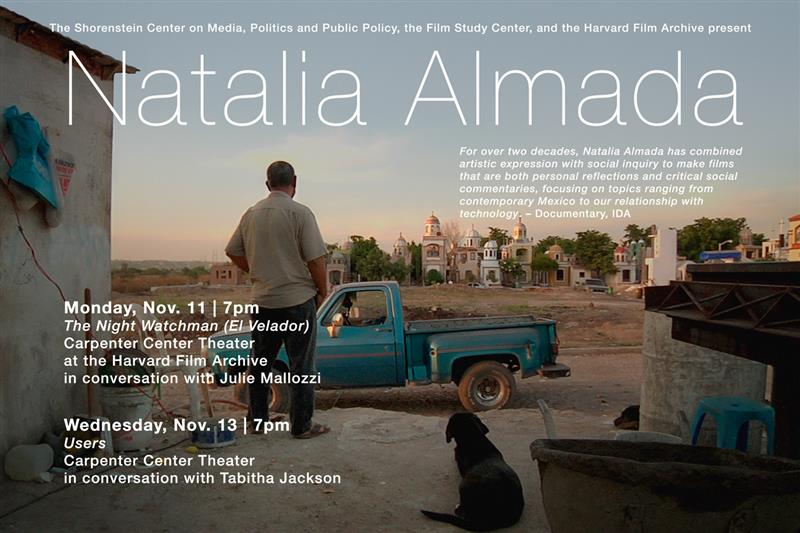The Documentary Film in the Public Interest Initiative (DFPI) at the Shorenstein Center, the Film Study Center at Harvard University, and the Harvard Film Archive invite you to attend two screenings of Natalia Almada’s films, The Night Watchman (El Velador) and Users. Born in Mexico City as the great-granddaughter of Mexico’s controversial president Plutarco Elías Calles, Natalia Almada makes intimate films exploring the tragedies in her own family history as well as the current violence in Mexico’s Sinaloa region. Her poetic, multilayered approaches to storytelling have won her a MacArthur Award, two Sundance Documentary Directing Awards, and screenings at Documenta13, The Museum of Modern Art, The Guggenheim Museum, and the 2008 Whitney Biennial.
A screening of The Night Watchman (El Velador) and Natalia Almada in conversation with Julie Mallozzi
Monday, Nov. 11 | 7pm | Carpenter Center Theater at the Harvard Film Archive
The Night Watchman (El Velador)
Directed by Natalia Almada
Mexico, 2011, DCP, color, 72 min.
Spanish with English subtitles
From the opening shot through a pickup truck’s foggy windshield entering a cemetery at sunset, El Velador is infused with an atmosphere of patient dread. At its center is Martin, who works from dusk until dawn watching over the extravagant mausoleums of some of Mexico’s most notorious drug lords. In portraying the daily labor of those who maintain the cemetery and eschewing the pervasive, graphic images of the violence behind many of these deaths, Almada asks viewers to consider the relationship between the workers and those honored there. Such restraint opens these spaces of contemplation throughout the film. Between Martin’s night shifts, masons frame the high cupolas and spread their cement, coconut vendors roll by with music playing, and florists arrange lavish wreath displays in time for the luxury cars to arrive for services. With radio reports about the weather and the latest murders comprising most of the film’s dialogue, El Velador becomes a kind of landscape film: one capturing not only the vistas of this peculiar place but an aura generated by years of gross inequality, corruption and ever-present violence.
This event is co-presented by the Shorenstein Center, the Film Study Center at Harvard University, and the Harvard Film Archive.
A screening of Users and Natalia Almada in conversation with Tabitha Jackson (Shorenstein fellow spring ’24)
Wednesday, Nov. 13 | 7pm | Carpenter Center Theater at the Harvard Film Archive
Users
Directed by Natalia Almada
United States, Mexico, 2022, DCP, color, 81 min.
English; Spanish with English subtitles
Users begins with a mother’s question–will my children love the perfect machines more than they love me, their imperfect mother? She pushes the button, and a smart crib lulls her crying baby to sleep, flawlessly every time. This question guides her inquiry into the intimate relationship we have with technology that is increasingly driving all aspects of our society. We explore the unintended and often dehumanizing consequences of our society’s embedded belief that technological progress will lead to the betterment of humanity. Is technological progress inevitable? Are we all increasingly isolated? Do we really have agency to direct its course? Is technology an expression of our humanity or is technology destroying our humanity? The film will be a critical and intimate meditation on these questions.
Users traverses places ranging from the largest indoor vertical farm in the world to the perfect artificial wave, from an IVF embryo lab to a fiber optic cable landing. Invisible infrastructure that we all rely on is made visible. Our reliance on machines and our alienation from each other is palatable. Urgent global issues like climate change and privacy are explored from the intimate perspective of a mother thinking, worrying and loving her children. – Icarus Films
This event is co-presented by the Shorenstein Center and the Film Study Center at Harvard University.


